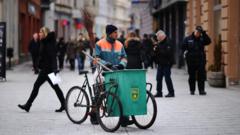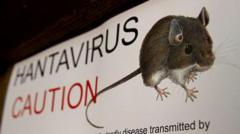In Sarajevo, the Year of the Rat has taken on a chilling reality as the Bosnian capital grapples with an alarming surge in rodent populations. Social media has been abuzz with images of rats swimming in the heavily polluted Miljacka river, a distressing sight for residents who are all too familiar with inadequate public services. Complaints about overflowing rubbish containers and illegal dumping have intensified, with many voicing frustration over the authorities' failure to remove dead animals from public spaces, including playgrounds where children play.
This sanitation neglect has fostered an environment where rats can flourish, presenting significant risks to human health. Health officials have reported a troubling increase in cases of leptospirosis — a disease commonly transmitted through contaminated water or soil from rat urine and feces. This week alone, the largest hospital in the region documented a dozen new cases in just one day, following a concerning trend throughout the month. The symptoms of leptospirosis can be severe, leading to headaches, muscle pain, bleeding in the lungs, and potentially fatal complications such as Weil's disease.
In light of the growing health threat, Sarajevo's local authorities have officially declared an epidemic, triggering emergency measures aimed at combating the crisis. A swift urban cleanup initiative is now underway, with municipal workers equipped with disinfectants deployed across the city. Schools have been instructed to maintain their facilities, especially playgrounds and grassy areas, while additional refuse collections are scheduled to combat the accumulating waste.
This proactive response marks a significant shift from the past two years, during which there was a noticeable lack of pest control measures, attributed to a failed procurement process involving sanitization efforts. Local leaders, including Sarajevo Canton Health Minister Enis Hasanovic, have framed this issue as one of community neglect rather than simply a health crisis.
However, concerns linger among healthcare professionals regarding the potential for further health risks. Former University Clinical Centre director Sebija Izetbegović, now a member of the Sarajevo Canton Assembly, warns that the city’s burgeoning rat population, thriving on plentiful food sources, could lead to cases of hantavirus as well.
For Sarajevo, the current situation underscores the critical need for sustainable waste management solutions and effective pest control. Thankfully, while leptospirosis can be deadly when left untreated—affecting more than half of severely impacted patients—none of the current cases reported have escalated to such heights of severity. Nonetheless, the situation remains precarious, and authorities are under pressure to bring effective solutions to a city long-awaited for proper sanitation and public health measures.

















